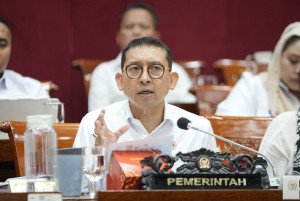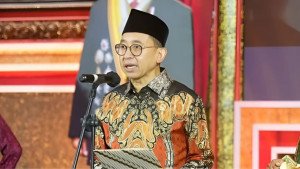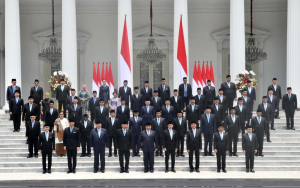New Indonesian history project stirs debate over objectivity, political complexity
As Indonesia prepares to celebrate the 80th anniversary of its independence, the governmen’s initiative to rewrite the nation’s history has reignited old tensions over how the past should be remembered and who gets to decide.
Titled Sejarah Nasional Indonesia (SNI), this 11-volume historical rewrite spans from prehistoric times to the administrations of Presidents Susilo Bambang Yudhoyono and Joko Widodo. Coordinated by a team of 113 scholars, including historians, archaeologists, and academics from 34 universities and eight institutions, the project is set for publication on August 17, 2025.
Despite government assurances of objectivity and inclusiveness, critics warn that the endeavor risks repeating the mistakes of the New Order era, when history became an instrument of State propaganda.
Culture Minister Fadli Zon, who is overseeing the project, pushed back against suggestions that the new history would become a State-imposed narrative.
“This is not official history,” Fadli said during a hearing with the Culture and Education Commission X the House of Representatives (DPR) on Monday, May 26, 2025.
“If anyone says it's ‘official history,’ that is just a figure of speech. There is no such thing as an official label being written in the book,” Fadli cited.
According to the minister, the volumes are intended to be a “national history”, a product of Indonesian scholars, written from an Indonesian perspective. “What we’re aiming for is a version of history that liberates itself from colonial frameworks and responds to the challenges of modernity and globalization,” he said.
Fadli emphasized that the project is not aimed at erasing sensitive events or diminishing the role of marginalized groups. In fact, he directly addressed viral claims that key historical episodes, like the role of women’s movements, had been removed. “That’s a hoax,” he said. “We are reinforcing, not erasing, the contributions of women in our history.”
He added that many Indonesians especially the youth lack basic historical knowledge. “Some don’t even know that Soekarno and Hatta are two different people. That’s the impact of globalized, fragmented information flows. This project is meant to provide a solid historical foundation,” he cited.
However, Fadli admitted the 11 planned volumes would only present the “highlights” of history. “If we wanted to write in full detail, we’d need over 100 volumes,” he noted.
Scholars divided
Still, not all academics involved are comfortable with the project’s structure or direction. Archaeologist Harry Truman Simanjuntak resigned as an editor earlier this month, citing violations of academic integrity. His resignation was prompted by changes in terminology, particularly the replacement of “prehistory” with “early history”, which he called “an epistemological error.”
“This is about principle,” Truman said as quoted by Fajar.co.id, on Tuesday, May 20, 2025.
“It’s misleading and goes against academic consensus. Worse, the project outline was created without involving expert editors and was approved by the minister before hand,” he continued.
He warned that the rewrite could become a form of historical laundering. “If negative aspects are erased and only positive ones remain, then we’re legitimizing power,” he said. Truman also revealed that his alternative proposal one that included a comprehensive account of the New Order and a full ‘prehistory’ section was dismissed outright.
A professor at the University of Indonesia and head of the history team, Susanto Zuhdi, defended the academic integrity of the project. “This isn’t propaganda. Unless data is deliberately deleted, we’re working from scientific sources. History belongs to everyone. Once it’s published, anyone can interpret or use it,” Susanto told CNN Indonesia on Friday, May 23, 2025.
Susanto acknowledged, however, that writing about more recent events, such as gross human rights violations, remains contentious. “We’re still working on that,” he said. “Some chapters are more like chronicles because we don’t have full access to the data as yet. This is history in the making.”
He emphasized that the goal is accepted history, a version that may not satisfy everyone but is collectively agreed upon for the sake of unity. “Absolute truth is not always possible. What matters is what we can accept and learn from,” he said.
While President Joko Widodo has acknowledged 12 major human rights violations, including the 1965 massacre and abuses in Papua and Aceh, it remains unclear how deeply these events will be examined in the final volumes. Susanto confirmed that a chapter on human rights is underway and being handled with care.
Future of democracy
Beyond the halls of academia and government, some scholars are issuing more forceful warnings. Yanuar Nugroho, a lecturer from the Driyarkara School of Philosophy described the project as potentially dangerous if it silences victims or erases controversial periods.
“When the state controls what is remembered and what is forgotten, the real loss is not just historical accuracy, it’s public courage,” Yanuar said in a statement, on Wednesday, May 21, 2025.
“Students grow up without knowing about Semanggi (shooting incident), Tim Mawar (Rose Team) of abductors, or the Petrus killings. That’s how democracy collapses, not through bullets, but through engineered forgetting,” he cited human rights violation cases during the final years of the New Order government.
He warned that this could create a regime of impunity, where historical narrative replaces legal accountability. “Reconciliation without truth is not healing, it’s erasure,” he said.
Already have an account? Sign In
-
Start reading
Freemium
-
Monthly Subscription
20% OFF$29.75
$37.19/MonthCancel anytime
This offer is open to all new subscribers!
Subscribe now -
Yearly Subscription
33% OFF$228.13
$340.5/YearCancel anytime
This offer is open to all new subscribers!
Subscribe now






